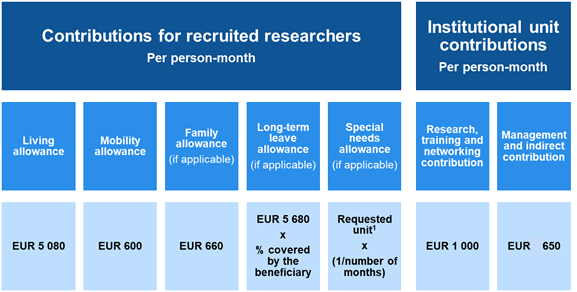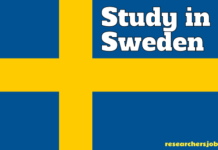Designation/Position- MSCA Postdoctoral Fellowships 2021
EU’s research and innovation program Horizon Europe invites application for MSCA Postdoctoral Fellowships 2021 from eligible and interested candidates
About- ‘Horizon Europe’ (2021-2027) is the new research and innovation framework programme of the European Union and, as under the previous programme ‘Horizon 2020’, it offers opportunities for both collaborative research and mobility of researchers.
The mobility actions are under Pillar 1 of Horizon Europe, under the well-known Marie Skłodowska-Curie Actions (MSCA) programme.
Key Highlight
- Horizon Europe (2021-2027) is the new research and innovation framework programme of the European Union.
- It offers opportunities for both collaborative research and mobility of researchers.
- The novelty in MSCA in Horizon Europe (compared to MSCAHorizon 2020) is that Euratom areas of research are included in the range of supported topics within the 8 existing scientific panels.
- Only one proposal per individual researcher can be submitted.
- Applicants must indicate at the submission stage in which of eight different scientific areas their proposal fits best.
- There is no age limit.
- The postdoctoral candidate must be a national or long-term resident of an EU Member State or country associated to Horizon Europe.
- Indian Host Institutes are, however, not eligible to host a global fellow for Euratom research.
- The eight year period is measured[1] from the date of award of the doctoral degree
- Years of experience outside research like teaching, working in industry on nonresearch areas and career breaks like parental leave, medical leave, national service, and long term sick leave (period of more than 30 days) will not count for the number of years.
- Only the last submitted one will be considered eligible.
Research/Job Area-
The MSCA-PF will continue to support Postdoctoral research in all domains of research and innovation (bottom up principle). The novelty in MSCA in Horizon Europe (compared to MSCAHorizon 2020) is that Euratom[1] areas of research are included in the range of supported topics within the 8 existing scientific panels.
The 8 scientific panels are:
- Chemistry (CHE)
- Social Sciences and Humanities (SOC)
- Economic Sciences (ECO)
- Information Science and Engineering (ENG)
- Environment and Geosciences (ENV)
- Life Sciences (LIF)
- Mathematics (MAT)
- Physics (PHY)
Applicants must indicate at the submission stage in which of eight different scientific areas their proposal fits best.
[1] Indian Host Institutes are, however, not eligible to host a global fellow for Euratom research.
More Opportunities:
Humboldt Research Fellowship in Germany: Postdocs & Experienced Researchers
Location- Europe
Eligibility/Qualification–
- No age limit.
- The postdoctoral candidate must be a national or long-term resident of an EU Member State or country associated to Horizon Europe (long-term resident period of legal and continuous residence of at least 5 consecutive years)[1].
- Mobility Rule: the postdoctoral candidate cannot have resided or carried out its main activity (work, studies, research etc.) in the Third Country (e.g. India), where the outgoing phase takes place, for more than 12 months in the three years immediately before the call deadline.
- Fellows must be postdoctoral researchers at the date of the call deadline, i.e. in a possession of a doctoral degree. Applicants who have successfully defended their doctoral thesis, but who have not yet formally been awarded the doctoral degree, will be considered eligible to apply.
- No more/up to 8 years of full time equivalent (FTE) research experience at the time of application. The eight year period is measured[1] from the date of award of the doctoral degree. Years of experience outside research like teaching, working in industry on nonresearch areas and career breaks like parental leave, medical leave, national service, and long term sick leave (period of more than 30 days) will not count for the number of years.
- Only one proposal per individual researcher can be submitted. In case of several proposals involving the same individual researcher, only the last submitted one will be considered eligible.
- If proposals with the same research objectives and work plan are submitted by host organisation or different researchers, only the first submitted one will be considered eligible.
[1] Maternity leave (18 months – i.e. 548 days) per child born after the PhD award date, or exact duration of leave taken, whichever is longest); Paternity leave (exact duration per child born after the PhD award date);Research in a nonassociated TC (only for nationals or long-term residents of MS or AC, wishing to reintegrate in Europe); Compulsory national service; Time spent not working in research (also applies to part-time contracts); Long-term sick leave (periods longer than 30 days).
Job/Position Description-
This flyer outlines the scope and modalities to participate in the MSCA – Postdoctoral Fellowship (MSCA-PF) for Global Fellowships (e.g. Europeans interested in pursuing research in the world/India). It aims at helping postdoctoral aspirants in applying for the grant, providing guidance on the formalities to comply with and facilitating project preparation. It is without prejudice to the call text itself, which remains the basis for applying and should always be consulted in full.
Main Objectives of a Postdoctoral Fellowships (PF)
- Foster excellence through implementation of an original and personalised research
- Enhance the creative and innovative potential of researchers holding a PhD (training on research + transferable skills) + support to career development
- Focus on i3 (international, inter sectoral, interdisciplinary) mobility
- Build bridges and lead to exposure to the non-academic sector

- Who and Where can your host institute be?
- MSCA fellow can be hosted by public or private sector research actors (universities, research institutes, private companies). Any socio-economic actor not included in the academic sector, in any industry or business partnership, is considered as private company.
- One host organisation in the EU 27 Member States or in any of the countries associated to Horizon Europe.
Global Fellowships are based on a secondment to a Third Country (e.g. India) for a period between 12 and 24 months, followed by a mandatory 12 month return period to the European host organisation located in an EU Member State or country associated to Horizon Europe.
- Candidate, together with the host organisation in Europe, apply to the call: the MSCA-PF proposals must be submitted electronically using the electronic submission system of the Funding and Tender Portal. Only the European host supervisor should press the “submit” button and take any other actions in the name of the organisation.
- Successful proposal receives funding for up to two years for initial outgoing phase and a mandatory return phase of 12 months.
- European host organisation receives the funding and recruits the awarded researcher.
Duration: 24 to 36 months
How to Apply-
- For Global Fellowships, optional secondments are permitted for up to one third of the outgoing phase. A maximum of three months can be spent at the start of the project at the beneficiary (or any other organisation mentioned in the description of the action), allowing the researcher to spend time there before going to the associated partner in the Third Country. Secondments cannot take place during the mandatory twelve-month return period to the host organisation in an EU Member State or country associated to Horizon Europe.
- The European host organisation must be located in an EU Member State or country associated to Horizon Europe, and, the associated partner organisation for the outgoing phase must be located in a Third Country and is the entity where the outgoing phase takes place.
Proposal structure
- The proposal is divided into two parts: Part A and Part B.
- Part A includes administrative and financial information of the host institution (beneficiary) and the researcher
- Part B includes the description of scientific and training activities. Part B-1, which introduces the beneficiary and partner organisations and describes the excellence, impact and implementation aspects of the proposal can be maximum 10 pages long. Part B-2, which contains the researcher’s CV, letter of commitment from associate partner from Third Country, a description of the participating organisations, an ethical self-assessment
Last Date for Apply– 12 October 2021
You can get our Regular updates on Telegram also
Find or Post Research Project PositionS – Researchersjob Board
See Also: Motivation Letter for PhD, Postdoc, and Other Research Positions
Whitesmoke Grammar Checker Online – Improve Your Research Writing Skill – Alternative to Grammarly
How to write a literature review: Tips, Format, and Significance
Research Proposal How to Write: Detail Guide and Template








